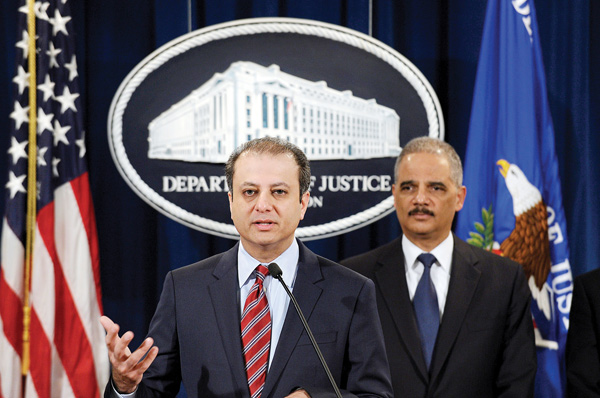Toyota case shows it’s hard to prosecute executives


Attorney General Eric Holder listens at right as U.S. Attorney for the Southern District Preet Bharara talks about the $1.2 billion settlement with Toyota over its disclosure of safety problems during a news conference at the Justice Department in Washington.
Associated Press
WASHINGTON
Efforts to conceal the extent of dangerous car defects at Toyota Motor Corp. were so pervasive, prosecutors say, that an exasperated employee at one point warned that “someone will go to jail if lies are repeatedly told.”
Yet no one has gone to jail, nor is likely to.
The Justice Department last week socked the car company with a $1.2 billion penalty but brought no criminal charges against individual executives, an unsatisfying resolution for consumer activists who say prison is the best deterrence for corporate malfeasance.
But prosecutors say they had little choice, in part because of constraints with evidence and the challenge of gathering testimony and information from witnesses outside the United States.
The same internal memos and public statements that buttressed the case against the corporation might well have been inadmissible as evidence against specific individuals. And it can be hard to prove that the person whose name is on a certain damning document was directly responsible for the misstatements or knew that they were wrong, legal experts say.
Though the case against the company may be overwhelming, lodging personal responsibility for misstatements “is more difficult to prove beyond a reasonable doubt,” said Stephen Saltzburg, a law professor at George Washington University.
Preet Bharara, the U.S. attorney for the Southern District of New York, whose office brought the case, told reporters last week that though he had not foreclosed the possibility of criminal charges against individuals, he expected the settlement to be the end of the matter.
When people who break the law live outside the country, “there are problems of evidence and problems of proof,” Bharara said when asked about the prospect of prosecuting individuals at the company.
The penalty is the largest of its kind ever brought against an auto company, according to the Justice Department.
General Motors Co. is facing a separate federal criminal probe in New York over delays in recalling small cars with a deadly ignition switch problem. It’s unclear whether any individuals are being investigated in that case or whether prosecutors would confront the same evidence problems if they wanted to charge specific people.
 43
43
